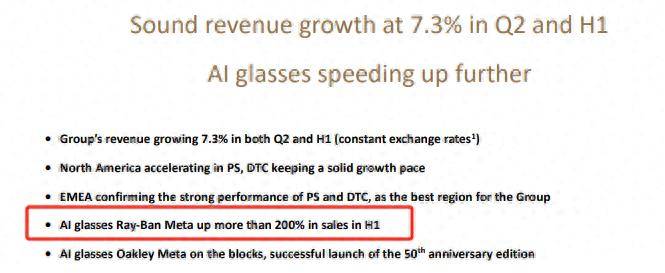Essilor Luxottica SA, the world’s largest glasses manufacturer, announced its second-quarter results. The company’s revenue exceeded market expectations, but its profit margin has been suppressed to a certain extent due to tariffs and investment in smart glasses.
According to the performance report released on Monday (July 28), the company’s second-quarter revenue increased by 7.3% to 7.18 billion euros (about 8.36 billion US dollars), an increase of 5.9% higher than analysts’ overall expectations.
Yishilu Luxuntika mentioned that due to the impact of the US tariff policy and the decline in exchange rate, the company’s gross profit margin in the first half of this year fell by 90 basis points (i.e. 0.9 percentage points) year-on-year to 63.4%.
But also due to more favorable product portfolio pricing, the company offsets the impact of tariffs and exchange rates to some extent.
This year, Esilo Luxuntika accelerated its entry into the smart glasses field, launching the Nuance Audio series that enhances hearing, and partnered with Facebook’s parent company Meta to launch the Oakley Meta series, expanding its business to the sports glasses field.
Although the move has pushed up costs, it has achieved remarkable results: the sales of the AI glasses series “Ray-Ban Meta” increased by more than 200% year-on-year in the first half of the year.

Cailianshe previously reported that earlier this month there was news that Meta had acquired about 3% of the shares of Esilo Luxuntika for about US$3.5 billion, further increasing its smart glasses business.
Meta CEO Mark Zuckerberg has said that this rapid growth field provides Meta with the opportunity to build its own hardware and control sales channels.
In the report, Esilo Luxuntika also reiterated its mid-term outlook: by 2026, the average annual average single-digit percentage (4%-6%) will be achieved, and the operating margin will be maintained between 19% and 20% of revenue.
In addition, the company continues to launch acquisitions in the medical technology field – one of the key pillars of its growth strategy. This month, the company agreed to acquire assets related to South Korea’s PUcore to develop monomer materials needed for contact lenses.





